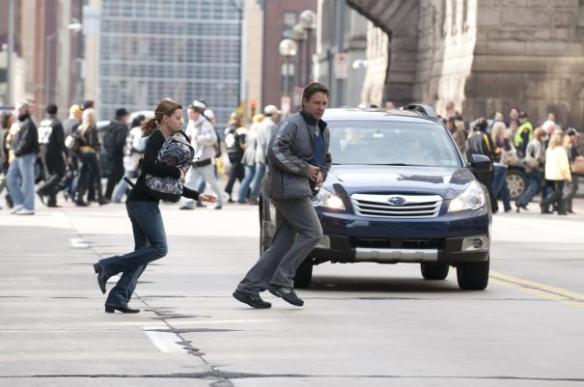(2018) Dramedy (Good Deed) Gėza Röhrig, Matthew Broderick, Sammy Voit, Bern Cohen, Ben Hammer, Leo Heller, Janet Sarno, Ziv Zaifman, Leanne Michelle Watson, Jill Marie Lawrence, Larry Owens, Isabelle Phillips, Marceline Hugot, Natalie Carter, Andrew Keenan-Bolger, Joseph Siprut, Linda Frieser, Stephanie Kurtzuba, Jaclyn S. Powell, Sarah Jes Austell. Directed by Shawn Snyder
In life, death is certain but growth is optional. The wisdom of a Star Trek movie “How we deal with death is at least as important as how we deal with life” is lost on most of us. We deal with death by ignoring it.
Shmuel (Röhrig) can’t ignore it. His beloved wife has just passed from cancer and it has thrown him for a loop. A cantor in the Hassidic Jewish faith, he is having a hard time dealing with it – he can’t even tear his coat properly until his mother supplies him with a tiny pair of scissors. Shmuel is nothing if not tied to his faith but he begins to have nightmares of his wife’s body decomposing. Troubled, he seeks the advice of his rabbi (Hammer) but is left unsatisfied. He needs to know precisely what is happening to his wife’s body. He has questions: is her soul suffering as her body decays? He needs to know.
His quest takes him beyond the parameters of his faith and to a scientist. Well, to a guy who teaches science at the local community college: Albert (Broderick). Albert is going through a rough emotional time of his own, having just been divorced. At first, he finds Shmuel’s persistence annoying – anybody would. Shmuel has the dogged determination of a mule trying to get that carrot. Eventually though Albert warms to the scientific aspect of the question and the two begin to delve into “experiments” that are started by an innocent remark on Albert’s part that Shmuel takes literally and eventually involves dead pigs, kidnapped pigs named Harold, road trips and body farms.
This movie is plenty quirky and mostly in an endearing way. Death and the mechanics of bodily corruption are not things we are geared to talk about much as a society. Nobody wants to know about the bacterial breakdown of our mortal remains; nobody wants to hear about maggot infestations and what happens to our skin, our eyes and our brains. It’s a vaguely disturbing subject but it is tackled with surprising compassion here.
It helps having a pair of charismatic leads. Broderick is perfectly cast here to the point where I can’t imagine any other actor playing this role. Albert is a bit of a kvetch in many regards and Broderick excels at those kinds of roles. Albert copes with his grief by smoking a lot of dope and listening to Jethro Tull – in other words, reverting back to his high school years in which he likely smoked a lot of dope and listened to a lot of Tull. I give the movie a lot of cultural points, by the way, for including Tull on the soundtrack. Rock on!
Röhrig, who some might remember from a much different movie called Son of Saul, plays a man who is consumed by his obsession to the point that he can’t see that his sons are also grieving and need him more than ever. His behavior is so odd that the two believe he has been possessed by a dybbuk, a kind of Jewish demon, and are researching the prospect on their own. The problem here is that often we don’t get a sense of Shmuel’s actual grief, the pain of losing someone so beloved although I will give you that maybe his obsessions with the body’s breakdown is his way of dealing with it. We all grieve in our own ways.
I don’t know enough about the Hassidic culture to determine whether or not the production was accurate on their rituals or lifestyle. Shmuel lives in an upstate New York townhouse, drives a station wagon and occasionally curses like a sailor. His sons are conversant with the Internet and computers. This is a different portrayal of their culture than I think most of us are used to.
Death isn’t an easy subject to tackle and our own mortality and the end disposition of our remains may be a little bit too uncomfortable a subject for some. The filmmakers are to be commended for taking it on and handling it in a mostly sensitive way – there is a lot of humor involved here but also a lot of respect for the subject. I’m not saying that this should be considered a primer in grief in any way, shape or form but any movie that allows us to discuss something so basic but so disconcerting deserves praise in any case.
REASONS TO SEE: The film is quirky in an endearing way. Broderick is solid as usual
REASONS TO AVOID: Röhrig is a bit too laconic at times. The subject matter may be too uncomfortable for some.
FAMILY VALUES: There are plenty of disturbing images of corpses, some brief nudity, drug use and a fair amount of profanity.
TRIVIAL PURSUIT: Scenes set at the community college were filmed at the City University of New York’s Staten Island campus.
CRITICAL MASS: As of 3/16/19: Rotten Tomatoes: 89% positive reviews: Metacritic: 66/100.
COMPARISON SHOPPING: The End
FINAL RATING: 6.5/10
NEXT: Everybody Knows



